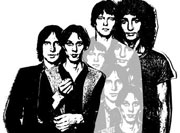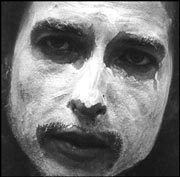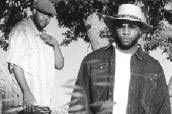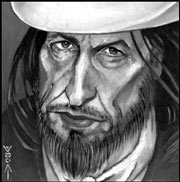TELEVISION
MARC OLSEN
Experience Music Project, Sky Church, 770-2702, $20
9 p.m. Tues., July 30
What with all the resurrections occurring around us—Elvis returning to the charts, Dana Carvey returning to film, Wilford Brimley returning to cable to shill for the insulin industry—you might be wondering whether age has dulled the edge of certain among our surviving Noo Yawk punk godfaddahs. The answer, we are happy to report, is a resounding “Get bent.”
To wit, the following exchange from our recent chin wag with Television’s Richard Lloyd:
Seattle Weekly: I don’t have much in the way of structured questions . . .
Richard Lloyd: This is the preview for the show?
Ye . . .
How many words?
Um. Eight, nine hundred.
OK. Ask whatever you need to know, and we’ll see if we can’t give you some help with your “unstructured approach.” You know the music, I take it?
I’m actually a fan.
OK.
Granted, set down in cold type the exchange seems innocuous (it’s not as straightforward a burn, for example, as “I used to buy Who albums—you know the Who?” which comes later). But during their first go-round, Television were always roughly 60 percent attitude, and attitude is roughly 80 percent inflection.
Television understood that better than most of their contemporaries, and it made their music timeless. With a protracted sneer, Tom Verlaine turned a neutral statement like “I see no evil” into a sinister declaration of amorality. And the music was just as nuanced: A bend of a string, a single unexpected note in a riff, turned your prior understanding of a song on its head. Always, Television reveled in cutting the legs from beneath their listeners.
Lloyd and Verlaine provided the band’s twin-lead-guitar attack, a protean approach that few groups—Sonic Youth being the sole high-profile exception—have duplicated with any kind of success, despite third-gen punkers’ frequent claiming of Television as direct antecedents.
“It’s kind of a, whaddoyoucallit,” Richard Lloyd says, “a wholesale . . . people claim us as an influence. And sometimes it’s a thing to be happy about, and other times you say, ‘Well. Look at that. Isn’t that interesting.’ Most of the time, what happens is that bands who try to use the Television sound don’t have two guitarists who are capable of that kind of interaction.”
Verlaine and Lloyd’s approach has survived unchanged through nearly three decades.
“The first time we stopped playing in ’78,” says Lloyd, “the band had more ‘length’ to it. The second time we got together was very quick: We did an album [1992’s Television] and a bunch of dates, and we’d finished the tour, and then the record company kind of fell apart on us. Right after we’d signed, they restructured and dropped a bunch of artists, and we were one of ’em. But we never stopped wanting to play together.”
After 1991, Television played heavily on the festival circuit, where their rep ensured a strong reception. But the recent resurgence of interest in early punk—particularly the New York scene—has further strengthened what was already a solid historical assessment.
“It’s a natural function of anniversaries—20 years, 25 years; people getting inducted and elected into halls of fame and so on,” Lloyd observes of that renewed interest. “It’s also a function of new people discovering older music that stands the test of time. And the test of commercialism, too. Do you think anyone’s going to be listening to Britney Spears in 12 years? It’s an actual question—I don’t know.
“You can probably answer it better than I can,” he nips. “You’re the journalist.”
Despite his reluctance to make any overarching pronouncements on popular music as an art form (“Don’t make this an article about me. I’m just the only person in the band who’s willing to talk to the press. Don’t make the article about that, either”), Lloyd does—eventually—cop to having seen some sea changes and even lets drop a surprising admission concerning Television’s early business savvy.
“When we were starting out, we used to say to the label, ‘Could you send out copies of the record to college radio?’ And the company went, ‘College radio doesn’t sell shit, we’re not wasting our money.’ And we said, ‘Could you make up some T-shirts? It’d be really good promo for the band.’ And they said, ‘Naaah. Nobody wants T-shirts.’
“And, of course, college radio and merchandising got absolutely huge. Things happen more quickly these days. If you have the machinery behind you, then you go from unknown to world-acknowledged in, like, two minutes. You look and say, ‘There’s a person: Boinnggg! They’re one of the superstars.’ But it can be a rapid fall, too. There’s a big appetite when you’re on TV.”
We start to speak over each other, and then Lloyd humbly clarifies:
“No, I was just going to differentiate: The other TV.”









